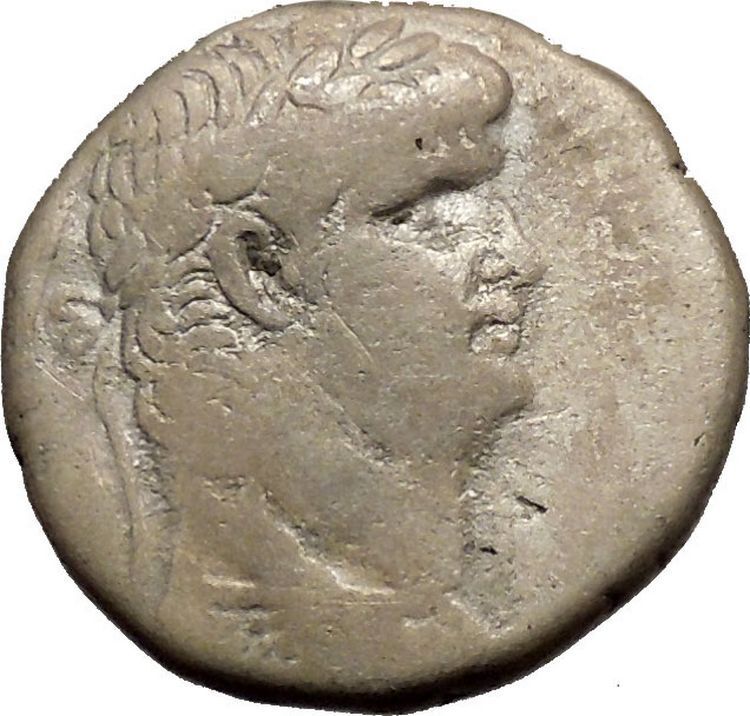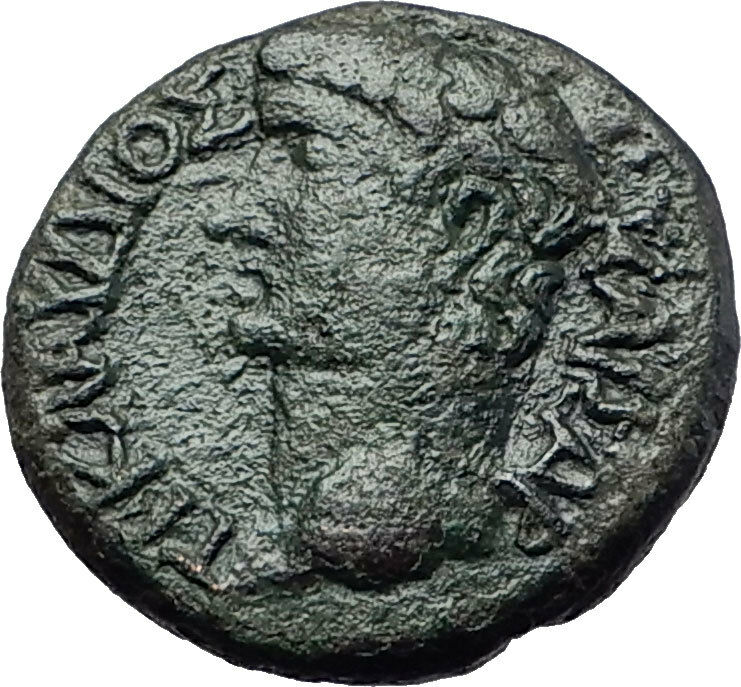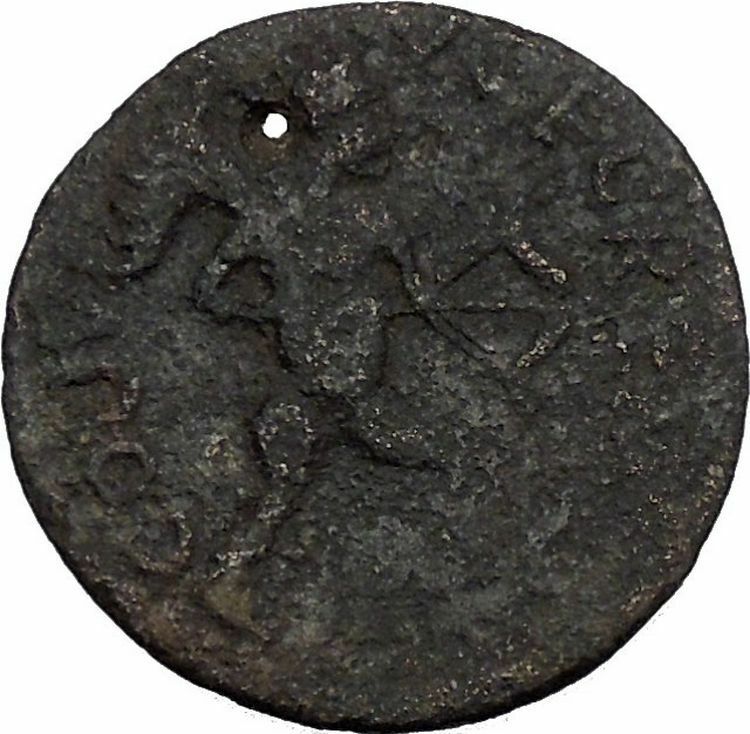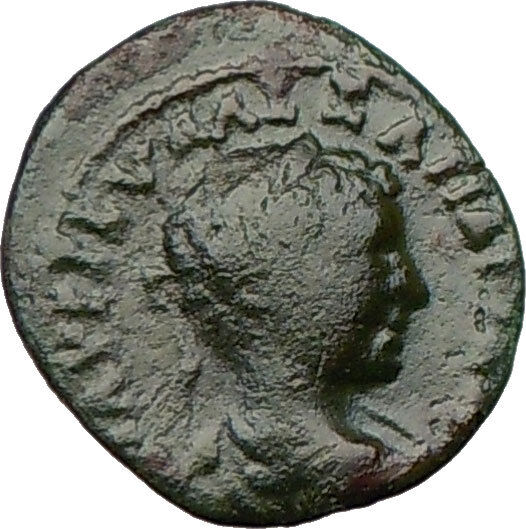|
Faustina II
–
Roman Empress
& Wife of
Emperor
Marcus Aurelius
–
161-175 A.D. –
Bronze Assarion 25mm (5.95 grams) of
Thessalian League in
Thessaly
Reference: Burrer, MA-G 7; BCD Thessaly II 966.1
ΦAYCTЄINA CЄBACTH, draped bust right.
KOINON ΘЄCCAΛωN, Athena Itonia striding right, hurling
spear held in her right hand, shield on her left arm.
You
are bidding on the exact item pictured, provided with a
Certificate of Authenticity and Lifetime Guarantee of
Authenticity.
Following the great victory of the Roman general Flamininus
over Philip V of Macedon, in 197 B.C., the freedom of the Greeks was proclaimed
at Corinth and a number of new autonomous coinages were initiated. Those in the
name of the Thessali were struck probably at Larissa. The Thessalian League
was a loose confederacy of feudal-like city-states and tribes in the Thessalian
valley in Northern Greece
and was run by a few aristocratic Thessalian families (Aleuadae
and Skopadae). The seat of the Thessalian diet was
Larissa
.
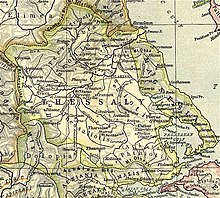
Thessaly
was home to extensive
Neolithic
and
Chalcolithic
cultures
around 6000–2500 BC (see
Cardium Pottery
,
Dimini
and
Sesklo
).
Mycenaean
settlements
have also been discovered, for example at the sites of
Iolcos
,
Dimini
and
Sesklo
(near
Volos
). In Archaic and
Classical
times, the
lowlands of Thessaly became the home of baronial
families, such as the
Aleuadae
of
Larissa
or the Scopads
of Crannon. In the 4th century BC
Jason of Pherae
transformed the region into a significant military
power, recalling the glory of Early Archaic times.
Shortly after,
Philip II of Macedon
was appointed Archon of Thessaly, and Thessaly
was thereafter associated with the Macedonian Kingdom
for the next centuries. Thessaly later became part of
the
Roman Empire
as part of
the province of
Macedonia
.

Athena
or Athene (Latin:
Minerva
),
also referred to as Pallas Athena, is the goddess
of war, civilization, wisdom, strength, strategy,
crafts, justice and skill in
Greek mythology
.
Minerva
,
Athena’s Roman incarnation, embodies similar attributes.
Athena is also a shrewd companion of
heroes
and the
goddess
of
heroic
endeavour. She is the
virgin
patron of
Athens
.
The Athenians built the
Parthenon
on the Acropolis of her namesake city, Athens, in her
honour (Athena Parthenos). Athena’s cult as the patron
of Athens seems to have existed from the earliest times
and was so persistent that archaic myths about her were
recast to adapt to cultural changes. In her role as a
protector of the city (polis),
many people throughout the Greek world worshiped Athena
as Athena Polias (“Athena of the city”).
Athens
and Athena bear etymologically connected names.
Annia
Galeria Faustina Minor (Minor Latin for
the younger), Faustina Minor or Faustina
the Younger

(February
16 between 125 and 130-175) was a daughter of
Roman Emperor
Antoninus Pius
and Roman Empress
Faustina the Elder
. She was a Roman Empress and wife
to her maternal cousin Roman Emperor
Marcus Aurelius
. Though Roman sources give a
generally negative view of her character, she was held
in high esteem by soldiers and her own husband and was
given divine honours after her death.
//
Biography
Faustina, named after her mother, was
her parents’ fourth and youngest child and their second
daughter; she was also their only child to survive to
adulthood. She was born and raised in
Rome
.
Her great uncle, the Emperor
Hadrian
, had arranged with her father for Faustina
to marry
Lucius Verus
. On February 25, 138, she and Verus
were betrothed.
Verus’ father
was Hadrian’s first adopted son and
his intended heir. However when Verus’ father died,
Hadrian chose Faustina’s father to be his second adopted
son, and eventually, he became Hadrian’s successor.
Faustina’s father ended the engagement between his
daughter and Verus and arranged for Faustina’s betrothal
to her maternal cousin,
Marcus Aurelius
; Aurelius was also adopted by her
father. On May 13, 145, Faustina and Marcus Aurelius
were married. When her father died on March 7, 161, her
husband and Lucius Verus succeeded to her father’s
throne and became co-rulers. Faustina was given the
title of
Augusta
and became Empress.
Unfortunately, not much has survived
from the Roman sources regarding Faustina’s life, but
what is available does not give a good report.
Cassius Dio
and the
Augustan History
accuse Faustina of ordering
deaths by poison and execution; she has also been
accused of instigating the revolt of
Avidius Cassius
against her husband. The Augustan
History mentions adultery with sailors, gladiators,
and men of rank. However, Faustina and Aurelius seem to
have been very close and mutually devoted. Her husband
trusted her and defended her vigorously against
detractors.
Faustina accompanied her husband on
various military campaigns and enjoyed the love and
reverence of Roman soldiers. Aurelius gave her the title
of Mater Castrorum or Mother of the Camp.
Between 170-174, she was in the north, and in 175, she
accompanied Aurelius to the east. However, these
experiences took their toll on Faustina, who died in the
winter of 175, after an accident, at the military camp
in Halala (a city in the
Taurus Mountains
in
Cappadocia
).
Aurelius grieved much for his wife
and buried her in the Mausoleum of Hadrian in Rome. She
was deified: her statue was placed in the Temple of
Venus in Rome and a temple was dedicated to her in her
honor. Halala’s name was changed to Faustinopolis
and Aurelius opened charity schools for orphan girls
called Puellae Faustinianae or ‘Girls of
Faustina’.[1]
The Baths of Faustina in
Miletus
are named after her.
In their thirty years of marriage,
Faustina bore Marcus Aurelius thirteen children:
-
Annia Aurelia Galeria Faustina
(147-after 165)
-
Gemellus Lucillae (died around
150), twin brother of Lucilla
-
Annia Aurelia Galeria
Lucilla
(148/50-182), twin sister of Gemellus,
married her father’s co-ruler
Lucius Verus
-
Titus Aelius Antoninus (born
after 150, died before 7 March 161)
-
Titus Aelius Aurelius (born after
150, died before 7 March 161)
-
Hadrianus (152-157)
-
Domitia Faustina (born after 150,
died before 7 March 161)
-
Fadilla
(159-after 211)
-
Annia Cornificia Faustina Minor
(160-after 211)
-
Titus Aurelius Fulvus Antoninus
(161-165), twin brother of Commodus
-
Commodus
(161-192), twin brother of Titus
Aurelius Fulvus Antoninus, later emperor
-
Marcus Annius Verus Caesar
(162-169)
- Vibia Aurelia Sabina (170-died before 217)
|








